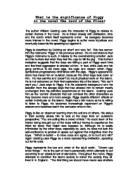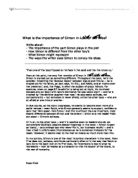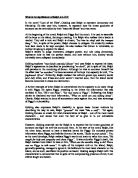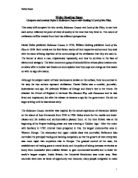What is the significance of Piggy in the novel The Lord of the Flies?
What is the significance of Piggy in the novel The Lord of the Flies? The author William Golding uses the character of Piggy to relates to certain themes in the novel. He is linked closely with civilisation, time and the conch which itself represents order. As savagery becomes more intense in the novel, Piggy begins to suffer more injustices and eventually loses his life speaking out against it. Piggy is described by Golding as 'short' and very 'fat'. This has earned him the nickname 'Piggy' in his previous school. It's no coincidence that Piggy's nickname is such, it relates to the overwhelming emotion Jack and his hunters feel when they feel the urge to 'kill the pig'. This indirect metaphor suggests that the boys are killing a part of Piggy each time and that their aggression is directed at him. In fact, while Jack and his gang continue to kill more pigs, the logic and reason which Piggy symbolizes progressively diminishes with the pigs. Piggy's appearance alone has made him an outsider, because the other boys look down on him. He has asmtha and doesn't do much physical work on the island. He is not welcomed on their first exploratory trip of the island. "We don't want you," Jack says to Piggy. It is his academic background and his isolation from the savage boys that had allowed him to remain mostly unchanged from his primitive experiences on the island.
Effectiveness of death of Simon
The effectiveness of the death of Simon At the beginning of the chapter, Simon realizes that the boys have mistaken the parachutist for the deadly beast that has plunged their entire group into chaos. Adding to his Christ like figure, he frees the parachutist from the rocks, and then, anxious to prove to the group that the beast is not real after all, Simon staggers down the mountain toward the distant light of the fire at Jack's feast to tell the other boys what he has seen. Golding uses the weather throughout the chapter to show the build up of tension on the island and then a release of all the built up tension. He opens the chapter with a sinister description of the odd weather on the island, with the "brassy glare" of the sky where "colours drained" and "nothing prospered". During the climax and the killing of Simon, the weather stimulates the confused frenzy as a streak of lightning is described as a "blue white scar" above the boys and the "dark sky shattered". Simon's death brings about the use of weather again used as a downpour erupts, as though the weather were responding to the boys' actions and because Simon is always very closely connected with nature, so the rain may represent tears - "the clouds opened...poured" Golding uses this thunderstorm as a means of terror and the result is that the fear drives the boys together. In the rain, Ralph asks Jack how
Read the passages in Chapter 3 where Jack and Simon are each in the Forest. How does the language convey their contrasting character and roles in the novel? Lord of the Flies is a thought-provoking novel about a
Read the passages in Chapter 3 where Jack and Simon are each in the Forest. How does the language convey their contrasting character and roles in the novel? Lord of the Flies is a thought-provoking novel about a group of English school boys who are stranded on a desert island. The book follows the striking change from civilisation to savagery, to illustrate the need for law and order in a society. Without this, the malicious nature of humanity can be revealed and the morality and values of life will be lost. Symbolism and imagery play an important role in the novel and through this, many themes are revealed. Throughout the book, the different characters and their roles are portrayed by a strong contrast in writing style and language chosen to describe them and their actions. A good example of this is Jack, described in the forest at the beginning of Chapter three, and Simon, described also in the forest, at the end of Chapter three. Jack is a prominent character with an unpleasant personality. His authority is expressed by his leadership of the choir who are now his hunters, and his will to be called by his surname at the boys' first meeting. Jack loves ordering people around and constantly attempts to weaken others, with Piggy being his usual victim. The freedom of the island makes it possible for him to reveal the darker sides of his personality which he had hidden up
Fear of the Unknown- Lord of the Flies
The Fear of the Unknown An important theme in William Golding's novel, 'Lord of the Flies' is that the fear, especially the fear of the unknown, is pervasive in mankind in such a way that even strong societies are too weak to protect their own people from the grasping power of it. In his novel, Golding illustrates this sense of fear that is found within every society and that can eventually lead to community or distress, disaster and human corruption. Let us first try and understand what is fear? Fear is a particular state of mind that can be originated either from a realistic circumstance or a sense of uncertainty. The fear of realistic origin could be resolved by removing root cause with time and effort. But the fear of uncertainty has the strong grasping power to which any human may succumb, however strong he is. It has a seating effect on our sub-conscious which is very difficult to get rid off. In this novel, this fear of uncertainty started off when a little one with a mulberry-coloured birthmark announced the existence of the beastie. "He says he saw the beastie, the snake-thing, and will it come back tonight?" "He says in the morning it turned into them things like ropes in the trees and hung in the branches." Even though this first fear was neglected by most of the big ones, especially Jack and Ralph who kept on saying that no such thing existed, but it still left
The symbolism of the beast in Lord of The Flies
The symbolism of the Beast & its significance to characters in LOTF In LOTF the beast is a symbol of fear, and is represented by Golding in many different ways. It is not only a physical thing, but also a presence within all of the boys, which creates an atmosphere of darkness, and horror. It is one of the signs that Golding uses to show that the island isn't as beautiful as it may seem, and that it has a dark side too. The beast is introduced when the littluns says that he has seen a "snake thing", describing it as "big and horrid." At first the beast is just a vague idea, and Simon says that the littluns scream in their sleep "as if it wasn't a good island." Highlights the dark side of the island. The main characters see the beast differently. As leader, Ralph tries to comfort the boys, by describing the idea of the beast as 'nonsense', which is helping the littluns come to terms with the idea. Jack almost undermines Ralph by saying that even if there was a beast "we'd kill it". This shows his hunter- gatherer quality. Piggy is the rational one, and says that "life is scientific", and that the beast doesn't exist. He gets close to the truth when he explains to the boys that it is possible to be "frightened of people." (The beast is within us all.) Simon is also very rational. He suggests that the only thing they should all fear is the savagery and evil in human nature.
What is the importance of Simon in 'Lord of the Flies'
What is the importance of Simon in Lord of the Flies? Write about: - The importance of the part Simon plays in the plot - How Simon is different from the other boy's - What Simon might represent - The ways the writer uses Simon to convey his ideas. 'Then one of the boys flopped on his face in the sand and the line broke up.' Even at this point, the very first mention of Simon in The Lord of the Flies, Simon is marked out as something different. Throughout the book, he is the outsider. Inhabiting the 'dubious region' between biguns and littluns - he is singled out for his faints, as Jack says, 'In Gib.; and Addis; and at matins over the precentor,' and, like Piggy, is often the subject of group ridicule. For example, when on page 92 he admits to being out at night, his mumbled excuses are put down with Jack's dismissive 'he was taken short' - and he is crushed by 'the derisive laughter that rose.' He also seeks solitude, not companionship - but somehow is never afraid, unlike the other boys - who are all afraid at one time or another. In due course, as the story progresses, he seems to become even more of a social recluse - even Ralph, who Simon generally seems to support, confides to Jack that 'He's queer. He's funny.' And this is without the one important, most drastic difference between Simon and the others - which only the reader finds out about - Simon's
law and order lord of the flies
Law and Order One of the first characters to emerge as a distinct personality is Piggy, who represents law and order. One of Piggy's first inspirations is brought about by the sight of a conch in a pool. When Ralph retrieves the conch, Piggy realizes that: "We can use this to call the others. Have a meeting". Piggy's first instinct is for organization, and the conch which he spots becomes a symbol of the fragile system of order that the boys create. Piggy is critical of the kind of freedom that leads to disorder and chaos. When the boys agree to build a fire on the mountain to send a smoke signal, the first meeting breaks up as everyone rushes towards the mountain. Like the crowd of boys, the fire quickly gets out of control, and one of the younger boys appears to be missing -probably trapped in the burning jungle. Piggy tells the others that they have acted "like a pack of kids!" and asks, "How can you expect to be rescued if you don't put first things first and act proper?" The only salvation Piggy can envision comes from behaving in an orderly manner. The degree to which he values this vision of order is shown by his reverence for the conch, which he attempts to protect from Jack later on in the book. Even when the majority of the boys have abandoned the original, organized society, Piggy clings to the shell, stubbornly believing that the beauty of order cannot be denied.
What particular aspects of human nature are explored in Lord of the Flies; and how have the author's techniques and choice of content deepened your understanding of this matter?
What particular aspects of human nature are explored in Lord of the Flies; and how have the author's techniques and choice of content deepened your understanding of the matter? In this essay, I will review the information I have gathered from the novel 'Lord of the Flies' by William Golding. The main aspects of human nature explored are: Evil within man, Fear of the unknown, and The need for civilisation. In the story, a group of schoolboys land on a deserted island due to a plane crash. They quickly set up a community and the boys are united in their quest for rescue. However, the lack of civilisation eliminates any common rules or morals, and the group soon starts to break apart. This brings out the evil which is within every human being. The constant fear of the unknown, represented as a 'beast', only increases the magnitude of this problem. Finally, the camp is split into two: The rebellious and 'evil' side, led by Jack; and the civilised and 'good' side led by Ralph, the original chief. The rivalry between Jack and Ralph forces this split, and their different opinions and priorities. This division finally results in the brutal murders of Simon and Piggy, with Ralph escaping narrowly from the clutches of Jack's tribe. William Golding uses characterisation to show the fear of the unknown in real life. The boys seem to have seen, or at least felt the presence of, a
In the novel Lord of the Flies, Golding uses Ralph to represent democracy and friendship.
What is the significance of Ralph in LOTF In the novel "Lord of the Flies", Golding uses Ralph to represent democracy and friendship. He also uses him, however, to represent how the innate goodness of someone can be overridden by their "essential illness" and vice versa. At the beginning of the novel, Ralph and Piggy find the conch. It is used to assemble all the boys on the island, forming a meeting. It is Ralph who realises that a leader is needed. They call a vote and Ralph is chosen, "Let him be chief with the trumpet thing". Yet, in-spite of his power, Ralph chooses to delegate. He evidently realises how Jack needs to be kept occupied. He also realises that Simon is vulnerable, so invites him along to explore the island. Ralph's ability to judge characters, delegate power, and rule using democracy, represents how he was the perfect leader, and how without him, society would inevitably have collapsed immediately. Golding explores "man-kinds essential illness" and uses Ralph to express his ideas. Ralph's appearance is described as proclaiming "no devil", yet in-spite of this, Ralph still partakes in the murdering of Simon. Although he tries to convince himself that the affair was "an accident" he becomes aware of the boys true capacity for evil, "I'm frightened. Of us". Evidently, Ralph realised that without grown-ups, anarchy would (and did) strike, and if
Comparison of Ralf and Jack
Comparison of Ralf and Jack In a group, there are always people who come out with better qualities as a leader than others. The strongest people however become the greater influences that others decide to follow. Sometimes though, the strongest person is not the best choice. In "Lord of the Flies," Ralph, though not a strong person, demonstrates a better understanding of people giving himself better leadership qualities than Jack. Through the book, it is shown that Jack thinks he is better and should be the leader, though all he creates is mayhem. Ralph shows useful human qualities as a leader by working towards making the boy's society better. He knows that he needs to keep the boys refined, and, to do that, he desires stability and array. Ralph decides to create rules and a small simple government to accomplish keeping everything in control. He understands that most of the boys have to be given reverence and be treated as equals, predominantly Piggy. Ralph keeps in focus about trying to get them off the island. His leadership makes peace and order on the island, while Jack's leadership creates pandemonium. Under Jack's rules, the group becomes uncivil wild beasts without discipline. Ralph wins the boys respect from his natural leadership abilities. By building shelter, he makes the boys' needs complete. When he says to Jack, "They talk and scream. The littluns. Even


























